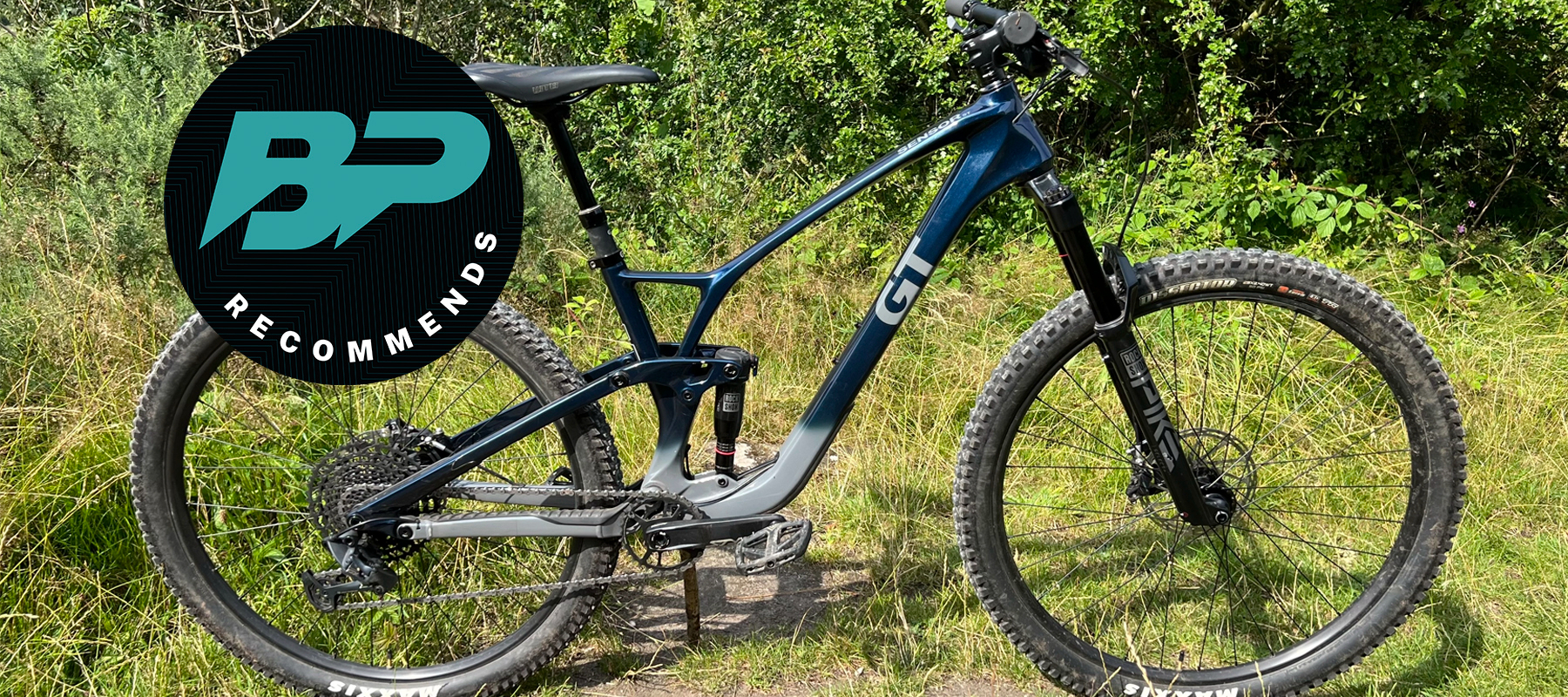Bike Perfect Verdict
GT's Sensor ST Carbon Pro isn't perfect, but this well-balanced, easy-riding, short-travel, mid-weight bike becomes a real bargain at the massively reduced price it's on sale for.
Pros
- +
A total bargain with its reduced RRP
- +
Well-balanced modern trail geometry
- +
Mid-weight carbon fiber frame with UDH hanger
- +
Really good suspension fork and shock
- +
Top quality tires
Cons
- -
Soft pedal feel won't suit everyone
- -
NX transmission elements are heavy
- -
Rear hub can feel gappy
- -
Asymmetric BB offset might upset some
Why trust BikePerfect
GT is one of many brands selling off older stock at up to half price due to the post-Covid crash. Its short-travel Sensor ST Carbon Pro trail mountain bike delivers a bang up to date, easy riding experience. It's great for playing in the local woods, wild singletrack or long days out, but is happy on the more hardcore stuff too. At its reduced price, the Sensor ST Carbon Pro is one of the best budget full-sus bikes around too.
Design and geometry
The carbon mainframe, seatstays and alloy chain stays are the same as the longer travel Sensor Carbon LE. Using a 47.5mm rather than 55mm stroke rear shock reduces travel to 120mm rather than 140mm. The shock is driven through a welded two piece linkage pivoting on the organically muscular seat tube. This has a triangulated split at the top to add stiffness but also evoke the signature 'Triple Triangle' frames of GT’s 1990s glory days. The LTS (Linkage Tuned Suspension) acronym has stayed too and it still uses a pivot on the chain stays. This means a relatively neutrally tracking rear axle path rather than a simple arc.
Thankfully, geometry has definitely changed since the '90s with a 65.4-degree head tube, 77.4-degree seat tube and a generous reach of 485mm on the large I tested. Ride height is relatively high for a 120mm travel bike at 340mm (39mm drop) while chain stays are relatively long at 440mm. That makes room for a cross brace on the chain stays while still leaving reasonable tire space.
Features include control routing through the front of the frame exiting just ahead of the mounting bridge for the vertical shock. That leaves plenty of room for a water bottle and strap-on cargo but there’s no bolted accessory mount. There’s an ISCG mount around the BB and a ribbed rubber chain slap guard. Unlike a lot of bikes being sold off cheap at the moment, it also has the latest UDH (Universal Derailleur Hanger) which makes finding spares easy and allows upgrading to SRAM’s T-Type rear mech at a later date.
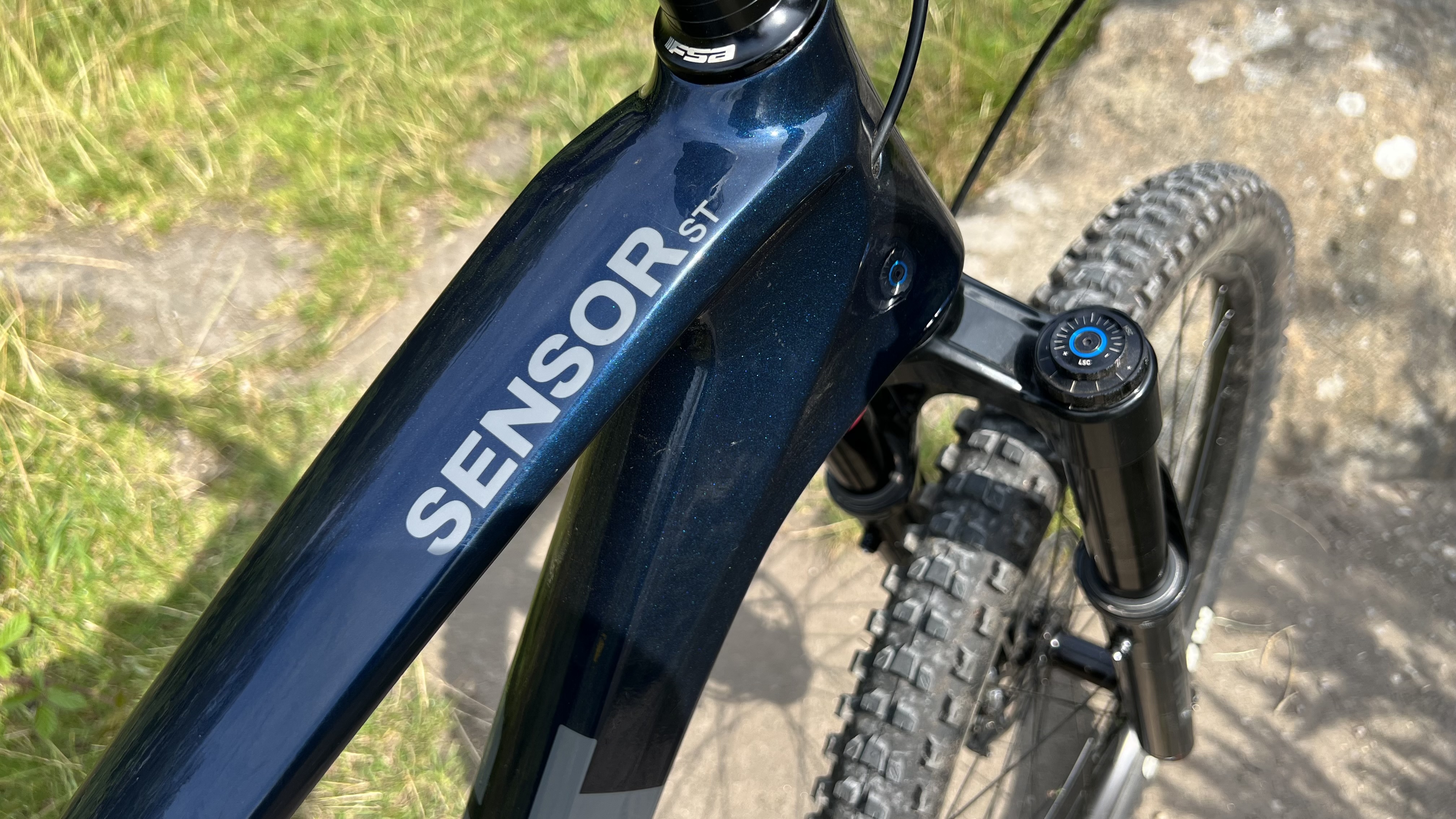
Components and build
You’re currently getting a previous generation SRAM GX Eagle rear mech though, triggered through NX shifters. A Truvativ Style chainset is something I’ve not seen for a while, but as part of the SRAM brand family it runs on the commonly available DUB bottom bracket standard. It pulls an NX chain around a heavy 11-50T NX cassette that uses an old school splined HG freehub that’ll mean upgrades to a lighter, wider range cassette will need sourcing outside the SRAM parts catalog – as its fancier cassettes only work with XD freehubs. The freehub on the Formula rear hub is also slow to engage which makes it clunky at times too. The rims are 27mm internal to save weight, but 32 spokes at each end adds some of that mass back in. While there are cost compromises in the gear and wheels spec, the Maxxis Dissector front and Rekon rear tires are top spec triple compound EXO carcass versions
A low rise 780mm bar and 45mm long stem sync well with the geometry with clamp-on mushroom grips and a WTB saddle to complete the contact points. A GT branded ‘DropKick’ dropper is fitted in size specific lengths with 125mm on the small frame, 150mm on the medium and 170mm on large and extra large.
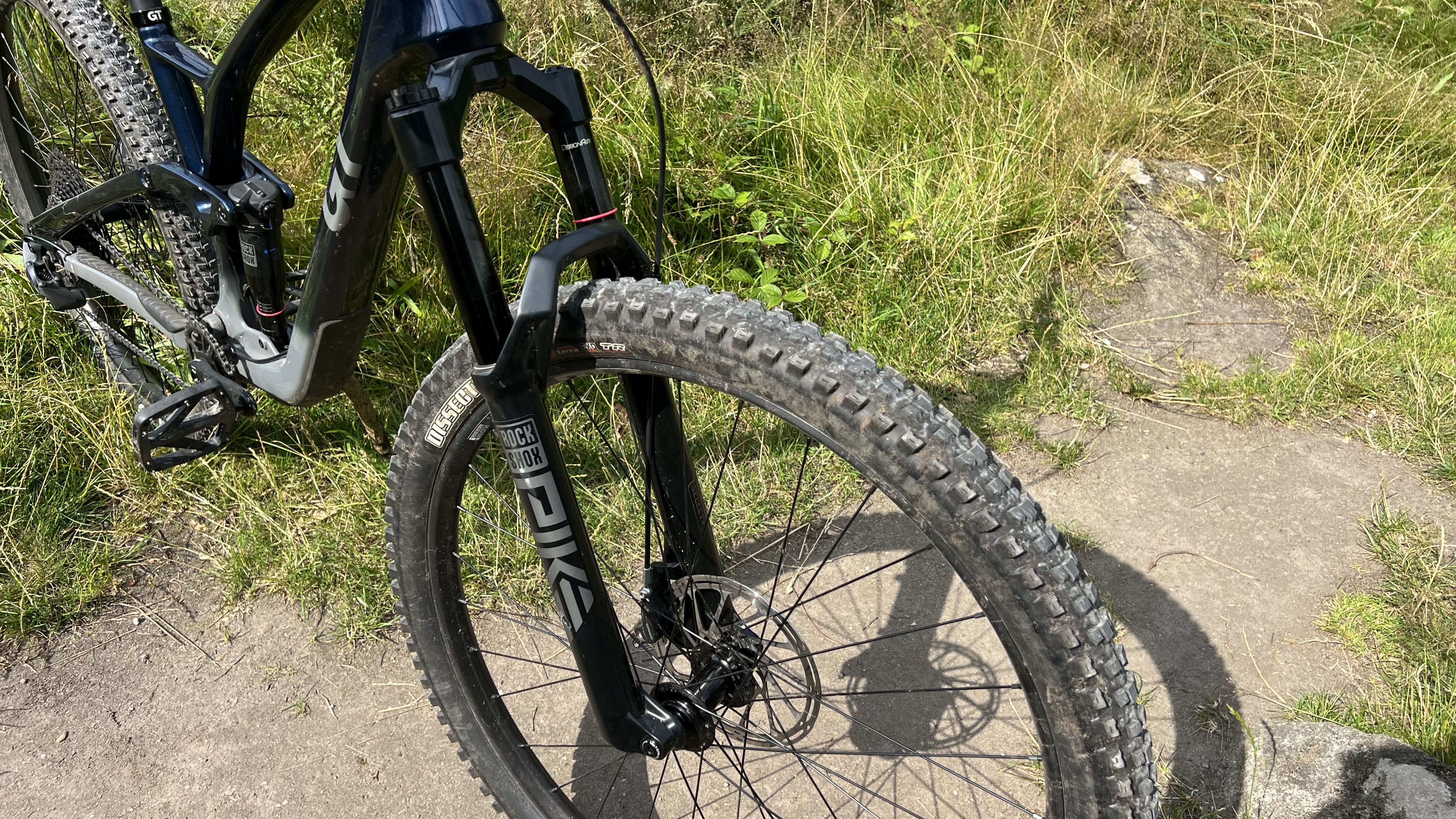
Ride, handling and performance
As you’d expect from the modern but not mental geometry numbers and the proven four-bar suspension system, the GT feels both familiar and well-balanced straight away. The biggest difference for riders coming off an older bike will be the steep seat angle shunting you forward over the bottom bracket. You’ll soon realize that the aggressive pedaling position is perfectly poised for steep climbs though. While it can bob and bounce if you really crank the power down at low revs, that means pedaling doesn’t interfere with consistent ground connection and traction. That can mean an isolated rather than interactive feel, but if you keep the cranks turning the ample ground clearance and plenty of grip means you can rely on the Sensor getting to some seriously tricky summits. If the bounce gets depressing you can always flick the shock lever across to a very firm and efficient locked position. The mid-width rims also give the tires a taller, faster-rolling feel. so it's a rapid-feeling bike on rolling, roller coaster trails, and a friend not a fight on long days out. Keep on top of your momentum though as it's not light for a short travel trail bike at 14.4kg. That makes acceleration steady rather than sprightly and the potential for an awkward gap between turning the cranks and the freehub engaging doesn't help either.
That leaves the already liberated and easy-flowing suspension free to move without pedal interruption. The shorter stroke in a relatively short overall shock length gives it a smoother feel than the more leveraged setup on the longer travel Sensor. This all added up to an almost gyroscopically leveled feel as I cruised across moorland singletrack or 'speeder biked' through rooty woods. The organic-looking carbon frame also feels more alive and 'spirited' than a lot of affordable composite chassis I've ridden. Overall that makes it a really easy bike to go fast on in easier situations. The smooth suspension, generous reach and stable head angle will get you a long way down more technical trails without a worry too. The previous generation Pike Select+ fork is a gem too, with the same Charger 3 damper as the Ultimate version but none of the chokey bushing QC issues of the more expensive fork. The 140mm front, 120mm rear travel imbalance doesn't feel bad either as the geo naturally weights you forward anyway. Lighter wheels and kit mean the ST is a kilo lighter than the longer travel Sensor LE. A very noticeable dynamic difference which isn't always the case with different travel bikes on the same platform.
The shorter rear travel is obvious once you really start slapping into bigger stuff or just hammering through prolonged jank though and that's when you'll start worrying about the relatively light and vulnerable rear tire too. The lively feel of the frame can start to get a spooked when it's having to deal with a lot of sideways loading from rough sections of aggressive cornering too. On the plus side, that reduces shock coming through to the rider for extra comfort on longer days. Its terrain following compliance and flow flatters the grip levels of both the Dissector front and Rekon rear tires too, easing you through potentially tricky situations in the same way the suspension does.
One curiosity that needs mentioning for those with sensitive knees, is that the bottom bracket is actually offset compared to the rear wheel and seat tube. It's only by a few mm though and none of the test team up here actually noticed it until someone who had got in touch with me after I posted a YouTube review on the bike.
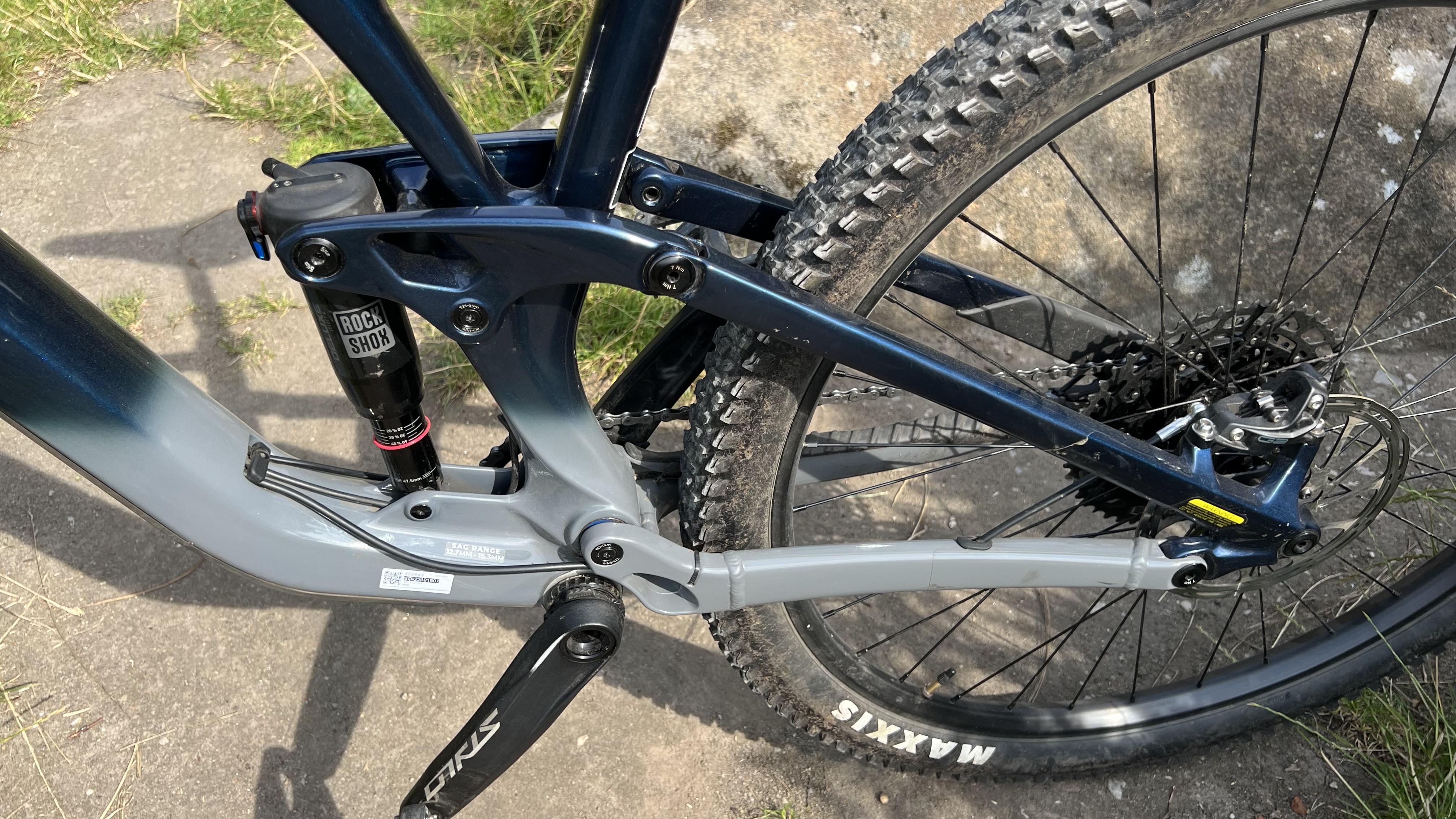
Overall verdict
GT's Sensor ST Pro is a nicely balanced, vice-free, easy-riding yet reasonably efficient all-rounder for classic – rather than enduro style – trail riding. Even at the original 4k price, the spec would be decent value for a carbon framed machine with up-to-date features like the UDH hanger. I'd be more critical of the 'hidden' NX components if that was still what you'd probably be paying for it though. While GT themselves are listing the bike at $2,990 in the US, the bike is still officially 4 grand in the UK and Europe. Whatever territory you're in, you'll be able to find the Sensor ST Carbon Pro available with a hefty discount at retail though.
| Attributes | Notes | Rating |
|---|---|---|
| Downhill performance | Decent geo and smooth suspension but only 120mm of it at the back | ★★★ |
| Climbing performance | Soft pedaling but tons of traction | ★★★ |
| Components and build | Well judged good value kit with a bit of hidden NX | ★★★ |
| Value for money | Presuming you buy it at half price it's a total bargain | ★★★★★ |
Tech spec: GT Sensor ST Carbon Pro
- Discipline: Trail
- Price: $2,990
- Head angle: 65.5 degrees
- Frame material: GT Sensor Carbon 120mm travel
- Fork: RockShox Pike Select+ 140mm travel
- Shock: RockShox Deluxe Select + RT 120mm travel
- Size: S, M, L (tested), XL
- Weight: 14.4kg
- Wheel size: 29in
- Chainset: Truvativ Stylo 6K 175mm arms with DUB bottom bracket.
- Rear mech: SRAM GX Eagle
- Shifter: SRAM NX Eagle
- Cassette: SRAM PG-1230, 11-50T 12-speed
- Brakes: SRAM G2 RSC hydraulic disc brakes with 180/160mm rotors
- Tires: Maxxis Dissector, 29 x 2.4in, 3C Maxx Terra EXO front and Maxxis Rekon 29 x 2.4" 3C Maxx Terra EXO rear
- Wheels: Formula hubs, WTB KOM Trail i27 rims
- Bars: GT Alloy Riser Bar, 20mm Rise, 780mm Wide
- Stem: GT Alloy 45mm
- Grips: GT Mushroom LockOn
- Seat post: GT DropKick 170mm dropper
- Saddle: WTB Silverado
| Attributes | Notes | Rating |
|---|---|---|
| Downhill performance | Great geo and big hit control, but harsh on rough sections | ★★★★ |
| Climbing performance | Efficient pedalling but very heavy and limited traction | ★★ |
| Components and build | Excellent component spec for the price | ★★★★★ |
| Value for money | Excellent value in terms of ride and spec | ★★★★★ |
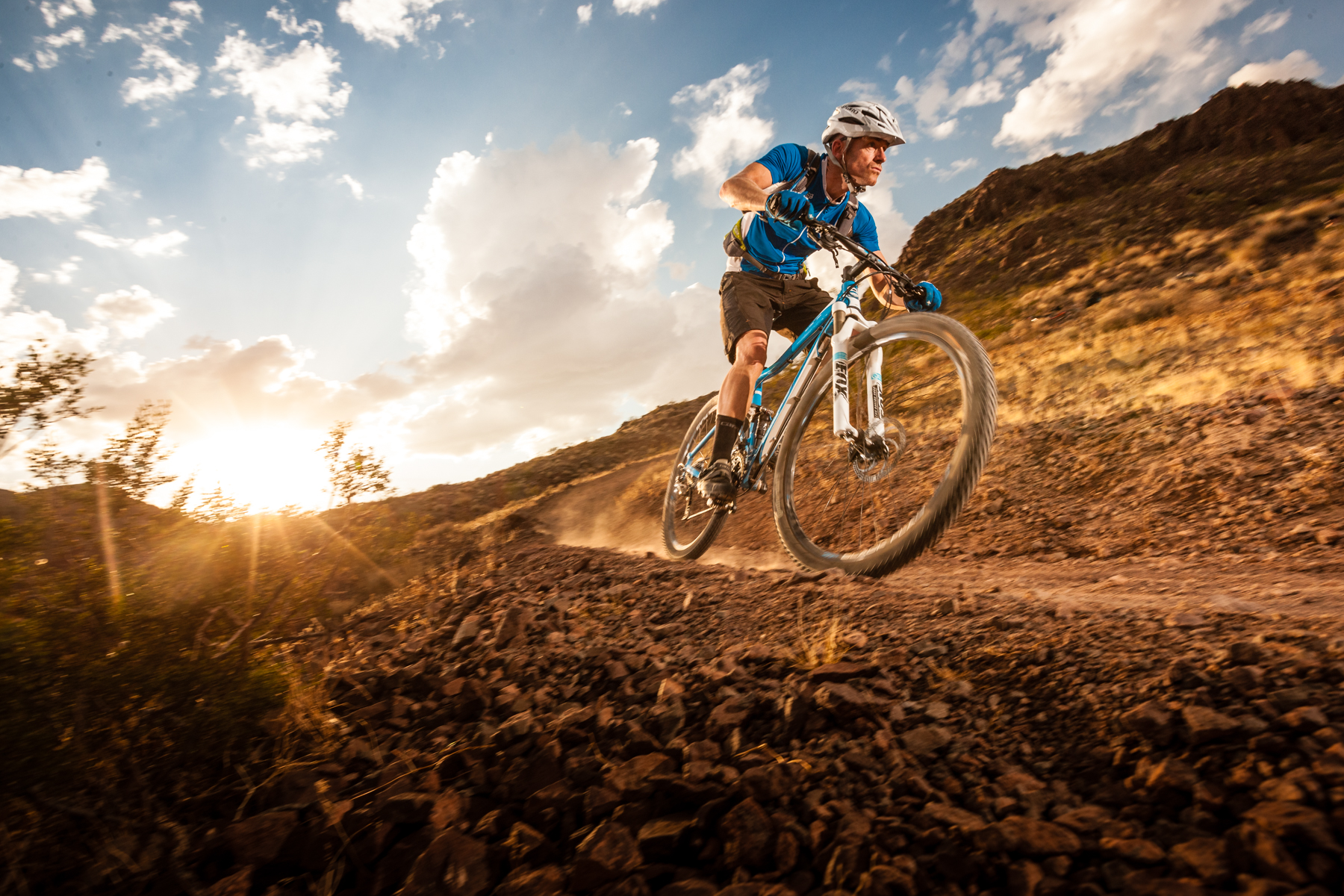
Guy Kesteven has been working on Bike Perfect since its launch in 2019. He started writing and testing for bike mags in 1996. Since then he’s written several million words about several thousand test bikes and a ridiculous amount of riding gear. He’s also penned a handful of bike-related books and he reviews MTBs over on YouTube.
Current rides: Cervelo ZFS-5, Specialized Chisel, custom Nicolai enduro tandem, Landescape/Swallow custom gravel tandem
Height: 180cm
Weight: 69kg
